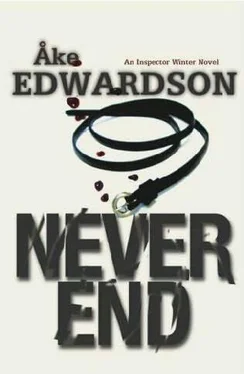"Don't you think he can handle it?"
"I didn't say that."
"That's what it sounded like."
Angela didn't reply. Winter took another swig.
"They're in the house in Lunden," he said. "Halders thought that was best. For the time being."
"I agree."
"He was resolute, I suppose you could say." Winter said. "When we left the hospital. Drove to their school."
Angela took a sip of wine, thought about the children.
"It was horrific," Winter said. "A horrific experience. A teacher stayed with them in the school until we got there." He took another slug of whiskey. It didn't taste of anything anymore, apart from alcohol. "It happened while they were still in class and so… well, they were still there."
"Did you drive them home?"
"Yes." Winter looked at the clock. "It took a few hours."
"Of course." She stood up, went to the stove, and switched off the fan. There was a different kind of silence in the kitchen. Winter could hear sounds from the courtyard. Glasses. Voices. "But they're not alone there now, I take it?"
"Hanne's there," Winter said. He'd called the police chaplain, Hanne Ostergaard. She was good at talking to people. Consoling them, perhaps. He didn't know. Yes. Consolation. "Halders didn't object when I suggested it." He could hear the voices again, a bit louder, but no words that he could make out. "Hanne was going to call for a psychologist, I think. They talked about it, in any case."
"Good."
"And Aneta came."
"Aneta? Aneta Djanali?"
"Yes."
"Why?"
"Halders phoned her. She came right over."
"Do they work together a lot?"
"Nearly all the time."
"Don't they have kind of a strained relationship?"
"Where do you get that idea from?"
Come on, Erik! We've spent some time with them. You've said the occasional thing…"
"Oh… that was just the kind of thing you say." He raised his glass and saw to his surprise that it was empty. He stood up and went over to the bottle. "He evidently needs her now." He poured. Three quarters of an inch. "It's not good to be alone. With the children."
"No relatives?"
"Not in Gothenburg, it seems."
Angela looked out of the window when he sat back down. It was beginning to get dark out there, with yellow lines over the sky above the rooftops. She could hear voices and the clink of glasses from the courtyard.
"I can't stop thinking about the children," she said, turning to face Winter again. "Were they completely devastated?"
"No. Not superficially at least. Very quiet. The shock, I suppose."
Somebody burst out laughing in the courtyard below, others joined in. He stood up and went to the window. Four stories down a group of friends was making the most of the summer's night. He closed the window but stayed where he was.
What would happen now? He needed Halders, but he wouldn't dwell on that for a single minute if Halders decided to stay at home. It was up to him. Winter was not going to lean on him. We're people before anything else, after all.
He went back to Angela and his whiskey.
It was hot in his office, suffocated by summer. No wind outside, nothing to suck into the room that would change the air clinging to everyone's skin.
Winter looked at the stack of files in front of him: papers, photographs. There were fresh printouts made by Mollerstrom from the hard disks, but most of the stuff smelled of the past. Five years ago, another summer. Beatrice Wägner. The papers concerning her violent death had an odor of dust and dry darkness-giving a false impression of peace-so pervasive that it almost made him push aside these cold case notes and instead take up the newly begun file on Angelika Hansson.
Reports on murder collected for eternal reading, over and over again. No peace. He'd had a special file of press clippings brought to his office. The newsprint felt as if it were a hundred years old when he touched it.
He stood up, went to the open window, and lit a Corps. The cigarillo tasted pure and soft after leafing through the old documents. It was his third of the morning. He smoked more than twenty a day. Each one was going to be his last. No smoking at home anymore, which was a good thing. Another good thing: Corps Diplomatique was a brand on its way out. His tobacconist had warned him. Every pack could be his last, but Winter was not in favor of hoarding. When Corps were no longer available, he'd stop smoking.
He inhaled, and watched the flow of traffic on the other side of the river. Streetcar, bus, car, streetcar again, pedestrians. All bathed in sunshine that cast no shadows now, as lunchtime approached.
When there are no Corps any more, I'll quit.
When there are no corpses any more, I'll quit. Ha!
He went back to his desk. He'd made up his mind to work his way through the Beatrice Wägner files, from the very beginning. All the witness reports, all the summaries. If there was anything there that could be of use to the present investigation, he'd find it. Try to find it. No-find it.
Beatrice Wägner had lived with her parents in a detached house in Påvelund, a western suburb of Gothenburg. Just over a kilometer south of the house in Längedrag where Jeanette Bielke lived. And it couldn't be much more than two kilometers south from Påvelund to the house in Onnerud when Angelika Hansson had lived, Winter noted. Due south.
He stood up again, and went over to the wall map of Gothenburg and traced with his finger a line running due north from the Hanssons' house through the Wagners' and ending up at Jeanette Bielke's home. A dead straight line. It was a peculiarity, but didn't necessarily mean anything. Probably didn't.
He kept looking at the map. Beatrice Wägner had attended the grammar school in Frolunda. Like Angelika and Jeanette, she'd passed her final exams. She'd stayed in Gothenburg when most of her friends had gone away on holiday. He recalled that she'd had some sort of summer job. Jeanette hadn't had a summer job. Angelika had moved into a warehouse.
Three girls, all of them nineteen years old. Just finished with school. Two of them this summer, and the third during a summer five years ago. Three different schools. Jeanette had said she didn't know Angelika. Had she known Beatrice? He must ask her about that. It wasn't impossible, after all. They had lived fairly close to each other, in upmarket suburbs next to the sea.
Had it always been the case? Had they attended the same elementary school, perhaps? Middle school? Calm down, Erik. There's no time to find the answer to every question now.
Had Beatrice and Angelika known each other?
Three girls. One was still alive, the other two were dead.
He remained standing by the map. If he boiled down all his questions to just one, to The Question, would it be: did they all get mixed up with the same murderer? The same bastard? as Halders had put it in this very office. Jeanette, too?
***
Winter continued reading, smoking at his desk now. Followed Beatrice through her last hour, or hours. She'd been in the town center with some friends. Had she been with them the entire time? That wasn't absolutely clear. They'd split up soon after one in the morning. Sunday morning. Five of them had gone off together and stopped off at a 7-Eleven five hundred meters from the park, and there, outside the shop, or inside it, something had happened to cause Beatrice to leave her friends.
Winter read through the witness reports. There was a slight mist around the words, as if these young people had memories that weren't really functioning. Winter knew what the problem was, he'd seen it hundreds of times. They were simply drunk, or at least in various stages of inebriation, and the alcohol had started to leave their bodies, but their senses were not properly sharp, and such things can make a person irritable and nervous, and something like that had applied to the scene at the shop. Something had annoyed Beatrice and she'd left. Yes, they could recall that she'd been annoyed, but nobody could remember why. Perhaps she'd tried to light up a cigarette inside the 7-Eleven. Perhaps she just hated the whole world at that drunken moment. There had been alcohol in her blood, but not very much.
Читать дальше












